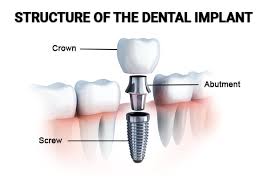What is Dental Implant?
A dental implant is a surgical component that interfaces with the bone of the jaw or skull to support a dental prosthesis such as a crown, bridge, denture, facial prosthesis, or to act as an orthodontic anchor. Essentially, it serves as an artificial tooth root.

Here are the key components and process involved in getting a dental implant:
Implant Fixture(Screw): This is the part that is surgically placed into the jawbone. It is typically made of biocompatible materials such as titanium, which allows it to fuse with the bone through a process called osseointegration.
Abutment: Once the implant fixture has integrated with the jawbone (which can take several months), an abutment is placed on top of the implant. The abutment connects the implant fixture to the dental prosthesis.
Prosthesis(Crown): This is the artificial tooth or teeth that are attached to the abutment. It can be a single crown, a bridge to replace multiple teeth, or even a denture for replacing an entire arch of teeth.
The process of getting a dental implant typically involves multiple stages:
Consultation: Initial assessment and planning with a dentist or oral surgeon to determine if you are a suitable candidate for implants.
Implant Placement: Surgical procedure to place the implant fixture into the jawbone. This is usually done under local anesthesia.
Healing and Osseointegration: A period (usually several months) is allowed for the implant to integrate with the jawbone. During this time, a temporary restoration may be placed.
Abutment Placement: Once osseointegration is confirmed, a second minor surgery may be required to place the abutment.
Prosthesis Attachment: Finally, the dental prosthesis (crown, bridge, denture) is attached to the abutment, completing the restoration.
Dental implants are known for their durability, functionality, and natural appearance. They provide a long-term solution for replacing missing teeth and can significantly improve oral health and quality of life for many patients. However, candidacy for dental implants depends on factors such as sufficient bone density in the jaw and overall oral health.
FAQs about dental implants:
Who is a candidate for dental implants?
Dental implants are suitable for most adults who have good general and oral health. Adequate bone in the jaw is necessary to support the implant. Your dentist or oral surgeon will assess your individual situation to determine if you are a candidate.
What are the benefits of dental implants?
Dental implants offer several benefits, including improved appearance, enhanced ability to chew and speak, durability (they can last a lifetime with proper care), and preservation of facial structure by preventing bone loss that occurs when teeth are missing.
Is the dental implant procedure painful? The procedure is typically performed under local anesthesia, so you should not feel pain during the surgery. Mild discomfort after the procedure is common and can be managed with pain medications as prescribed by your dentist.
How long does it take to complete the dental implant process?
The entire process can take several months to over a year, depending on factors such as the healing time needed for osseointegration (fusion of the implant with the jawbone) and the complexity of the case. Each stage of the process requires careful planning and assessment.
Are dental implants safe?
Dental implants have a high success rate, typically over 95% for properly selected patients. They are considered a safe and effective treatment for replacing missing teeth when performed by a qualified dentist or oral surgeon.
How do I care for dental implants?
Dental implants require regular brushing, flossing, and dental check-ups, just like natural teeth. Proper oral hygiene is crucial to prevent complications such as peri-implantitis (inflammation around the implant).
Can smokers get dental implants?
Smokers have a higher risk of implant failure and complications such as poor healing and infections. However, implants can still be successful in smokers if they are committed to quitting or reducing smoking and maintaining good oral hygiene.
What happens if a dental implant fails?
While rare, dental implant failure can occur due to factors such as infection, poor bone integration, or excessive stress on the implant. In such cases, your dentist will evaluate the cause and discuss options for replacement or alternative treatments.
How long do dental implants last?
With proper care and maintenance, dental implants can last a lifetime. Regular dental visits and good oral hygiene practices are essential to ensure the longevity of your implants and overall oral health.
For personalized advice and information specific to your situation, it's best to consult with a qualified dental professional.
更多 Smile Delight Dental Clinic 相关资料 Malaysia
Malaysia